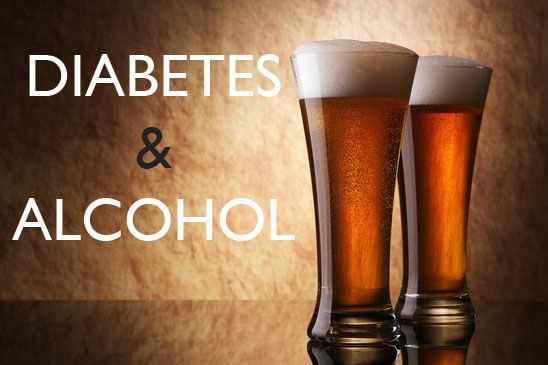Get the App
For Doctors
Login/Sign-up
Last Updated: Aug 29, 2019
BookMark
Report
People with diabetes should be particularly cautious when it comes to drinking alcohol because alcohol can make some of the complications of diabetes worse. For starters, alcohol impacts the liver in doing its job of regulating blood sugar. Alcohol can also interact with some medications that are prescribed to people with diabetes. Even if you only rarely drink alcohol, talk with your healthcare provider about it so that he or she knows which medications are best for you.
Here’s what you need to know:
1. Alcohol interacts with diabetes medications.
Alcohol can cause blood glucose levels to rise or fall, depending on how much you drink. Some diabetes pills (including sulfonylureas and meglitinides) also lower blood glucose levels by stimulating the pancreas to make more insulin. Combining the blood-sugar-lowering effects of the medication with alcohol can lead to hypoglycemia or “insulin shock,” which is a medical emergency.
2. Alcohol prevents your liver from doing its job.
When you drink alcohol, your liver has to work to remove it from your blood instead of working to regulate blood sugar. For this reason, you should never drink alcohol when your blood glucose is already low.
3. Never drink alcohol on an empty stomach.
Food slows down the rate at which alcohol is absorbed into the bloodstream. The Diabetes Teaching Center at the University of California in San Francisco recommends eating a meal or snack containing carbohydrates when you drink alcohol.
4. Always test blood sugar before having an alcoholic beverage.
Alcohol impairs your liver’s ability to produce glucose, so be sure to know your blood glucose number before you drink an alcoholic beverage.
5. Alcohol can cause hypoglycemia.
Within a few minutes of drinking alcohol, and for up to 12 hours afterward, alcohol can cause your blood glucose level to drop. After consuming alcohol, always check your blood glucose level to make sure it is in the safe zone. If your blood glucose is below 100 mg/dL, eat a snack to bring it up.
6. You can save your life by drinking slowly.
If you weigh 150 pounds, it takes about two hours for your liver to break down one alcoholic beverage.
Drinking too much alcohol can make you feel dizzy, sleepy, and disoriented—the same symptoms as hypoglycemia. Be sure to wear a bracelet that alerts people around you to the fact that you have diabetes, so that if you start to behave like you are intoxicated they know that your symptoms could be caused by hypoglycemia. If you are hypoglycemic, you need food and/or glucose tablets to raise your blood glucose level.
7. You can save your life by knowing your limit.
Your healthcare provider will tell you how much alcohol is safe for you to drink. Depending on your health condition, that may mean no alcohol at all. In some cases women with diabetes may have no more than one alcoholic beverage a day. Men should have no more than two.
Here’s what you need to know:
1. Alcohol interacts with diabetes medications.
Alcohol can cause blood glucose levels to rise or fall, depending on how much you drink. Some diabetes pills (including sulfonylureas and meglitinides) also lower blood glucose levels by stimulating the pancreas to make more insulin. Combining the blood-sugar-lowering effects of the medication with alcohol can lead to hypoglycemia or “insulin shock,” which is a medical emergency.
2. Alcohol prevents your liver from doing its job.
When you drink alcohol, your liver has to work to remove it from your blood instead of working to regulate blood sugar. For this reason, you should never drink alcohol when your blood glucose is already low.
3. Never drink alcohol on an empty stomach.
Food slows down the rate at which alcohol is absorbed into the bloodstream. The Diabetes Teaching Center at the University of California in San Francisco recommends eating a meal or snack containing carbohydrates when you drink alcohol.
4. Always test blood sugar before having an alcoholic beverage.
Alcohol impairs your liver’s ability to produce glucose, so be sure to know your blood glucose number before you drink an alcoholic beverage.
5. Alcohol can cause hypoglycemia.
Within a few minutes of drinking alcohol, and for up to 12 hours afterward, alcohol can cause your blood glucose level to drop. After consuming alcohol, always check your blood glucose level to make sure it is in the safe zone. If your blood glucose is below 100 mg/dL, eat a snack to bring it up.
6. You can save your life by drinking slowly.
If you weigh 150 pounds, it takes about two hours for your liver to break down one alcoholic beverage.
Drinking too much alcohol can make you feel dizzy, sleepy, and disoriented—the same symptoms as hypoglycemia. Be sure to wear a bracelet that alerts people around you to the fact that you have diabetes, so that if you start to behave like you are intoxicated they know that your symptoms could be caused by hypoglycemia. If you are hypoglycemic, you need food and/or glucose tablets to raise your blood glucose level.
7. You can save your life by knowing your limit.
Your healthcare provider will tell you how much alcohol is safe for you to drink. Depending on your health condition, that may mean no alcohol at all. In some cases women with diabetes may have no more than one alcoholic beverage a day. Men should have no more than two.



+1.svg)
